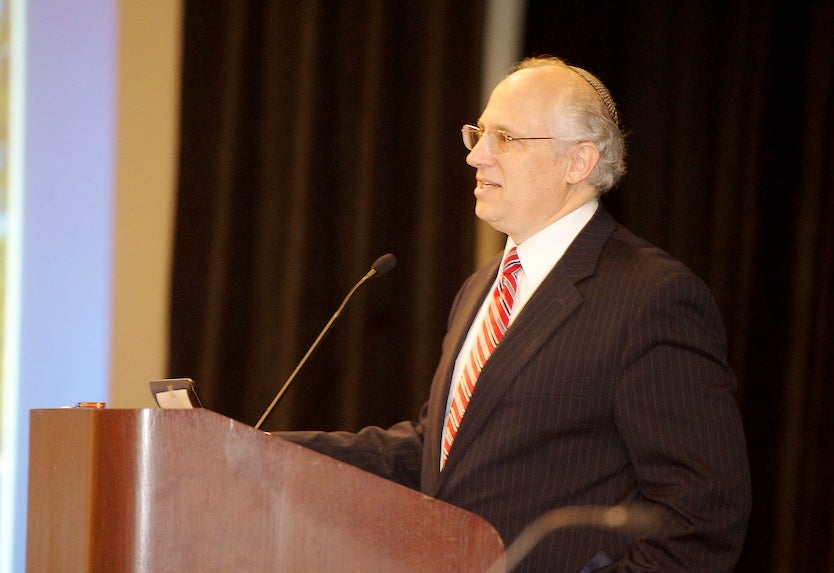Georgetown Hosts Complementary and Integrative Medicine Conference

Posted in GUMC Stories
 With more than a third of all adults using some form of complementary and alternative medicine (CAM), the need to standardize and integrate CAM into conventional medical and other health professions education continues to be steady call among educators in the field. To that end, more than 300 professionals in the field of complementary healthcare and integrative medicine (including 40 from outside the United States) gathered in October at the Georgetown University Conference Center for the 2012 International Congress for Educators in Complementary and Integrative Medicine.
With more than a third of all adults using some form of complementary and alternative medicine (CAM), the need to standardize and integrate CAM into conventional medical and other health professions education continues to be steady call among educators in the field. To that end, more than 300 professionals in the field of complementary healthcare and integrative medicine (including 40 from outside the United States) gathered in October at the Georgetown University Conference Center for the 2012 International Congress for Educators in Complementary and Integrative Medicine.
Teaching complementary and alternative medicine to future health care providers is partly driven by consumers looking for a new approach to treating illnesses, chronic diseases and other maladies. More that 38 percent of all American adults use CAM while 12 percent of U.S. children under age 17 also use some form of CAM, according to the 2007 National Health Interview Survey, the most recent national statistics gathered.
Still, integrating CAM education into traditional or conventional medical colleges has had significant challenges and was a primary topic at the three-day conference. Dozens of sessions offered participants an opportunity to share best practices in the development, implementation, evaluation, and dissemination of curricula and teaching methods for CAM while strengthening existing partnerships and developing new collaborations.
Notably, the conference comes 10 years after Georgetown University School of Medicine became the country’s first medical school to offer a master’s degree program in complementary and alternative medicine.
Stephen Ray Mitchell, M.D., dean for medical education at Georgetown’s School of Medicine, told conference attendees that the integration of CAM, especially mind-body medicine, into the Georgetown curriculum was significant.
“It changed the fabric of this school,” he said.
Mitchell told the gathering that today, 40 percent of the medical students at Georgetown take electives in mind-body medicine that extends across all four years of education.
“I’m so pleased to be part of both consortia in cosponsoring this [conference]. It’s a wonderful critical mass of people, and you’re changing American academic medicine. We’re very proud,” he concluded.
Aviad Haramati, Ph.D., a professor of physiology and co-founder of the CAM program at Georgetown, served as chair for the conference’s planning committee. He said the conference was organized, in part, because the research conferences where most attendees usually meet, weren’t adequate venues for discussing educational goals. His vision was to create a separate meeting to drill down on issues related to educating tomorrow’s conventional health professionals who have an awareness and knowledge about CAM to better advise their patients, and tomorrow’s CAM practitioners who have an understanding of science and evidence.
It is that kind of vision that distinguishes Haramati as a recognized leader in the field of CAM education.
During the conference, the chair of the Consortium of Academic Health Centers for Integrative Medicine (CAHCIM), Ben Kligler, M.D., announced that Haramati had been selected to receive the organization’s first Distinguished Service Award. CAHCIM was a co-sponsor of the conference along with the Academic Consortium for Complementary and Alternative Health Care (ACCAHC) and Georgetown’s School of Medicine.
ACCAHC chair Elizabeth Goldblatt, Ph.D., M.B.A./H.A., also acknowledged Haramati, thanking him for his “leadership, vision and ongoing commitment to creating dialogue and collaboration.”
During the conference, speakers addressed topics such as better integration of CAM into existing medical training and supporting clinical training using evidence-based strategies, educating future health professionals to become research literate, and strategies for interprofessional training and collaboration involving nurses, physicians and a variety of other health professionals in transforming the health care system.
At the end of the last day of the conference, Georgetown adjunct faculty member Martha Menard, Ph.D., C.M.T., who helped organize the conference, shared her closing thoughts with the audience about the previous three days.
“The collegiality, the openness, the many, many conversations and collegial interactions that I have experienced and observed in the last 3 days are just remarkable.”
The conference was supported in part by a grant from the National Institutes of Health (NIH grant: 1R13 AT007745-01).
By Karen Mallet, GUMC Communications
